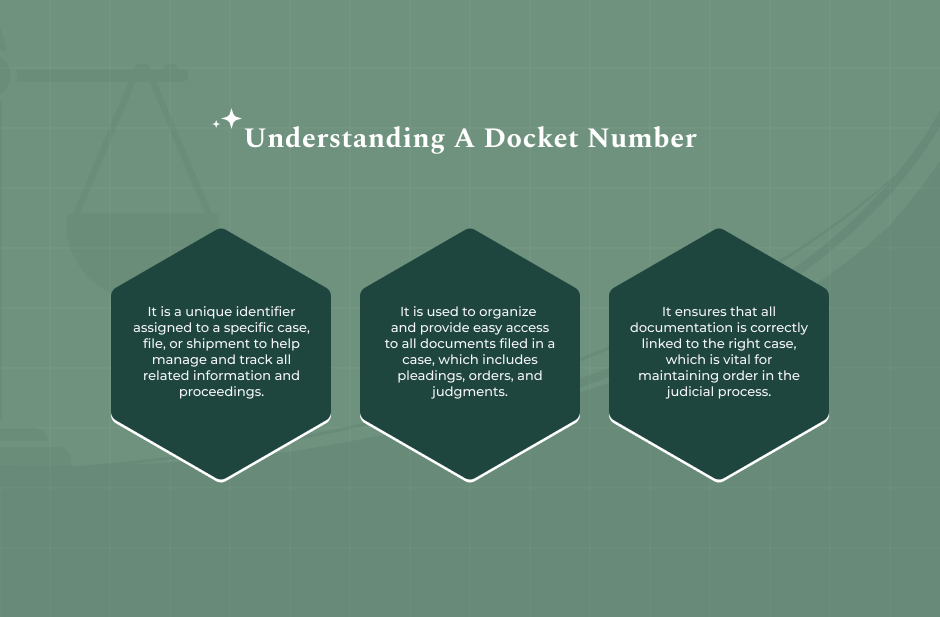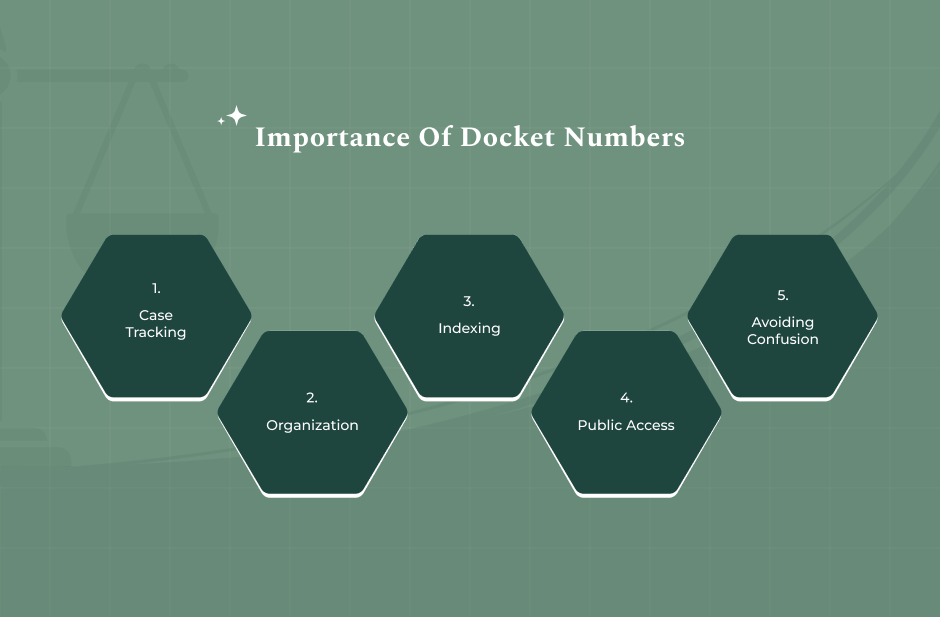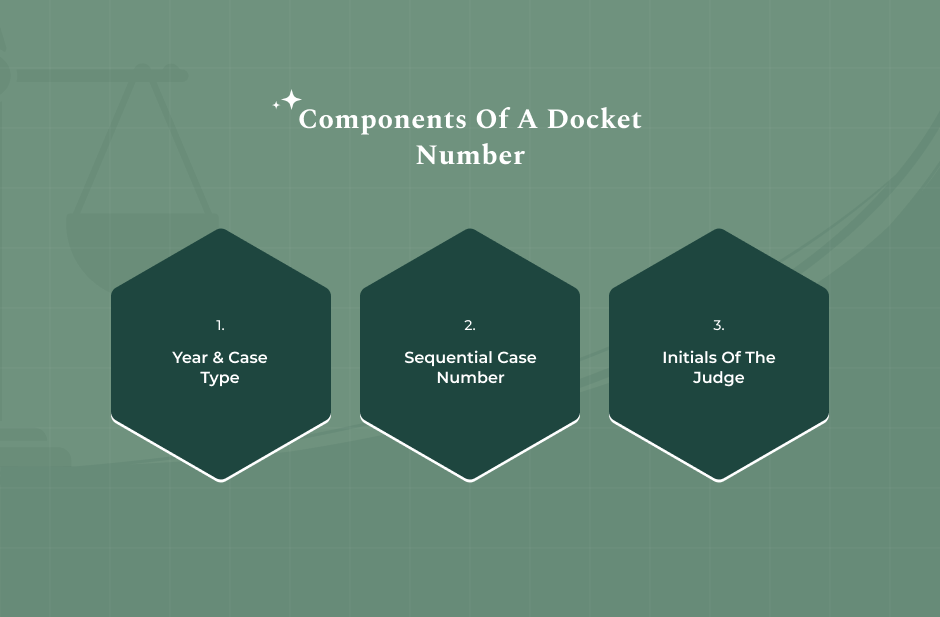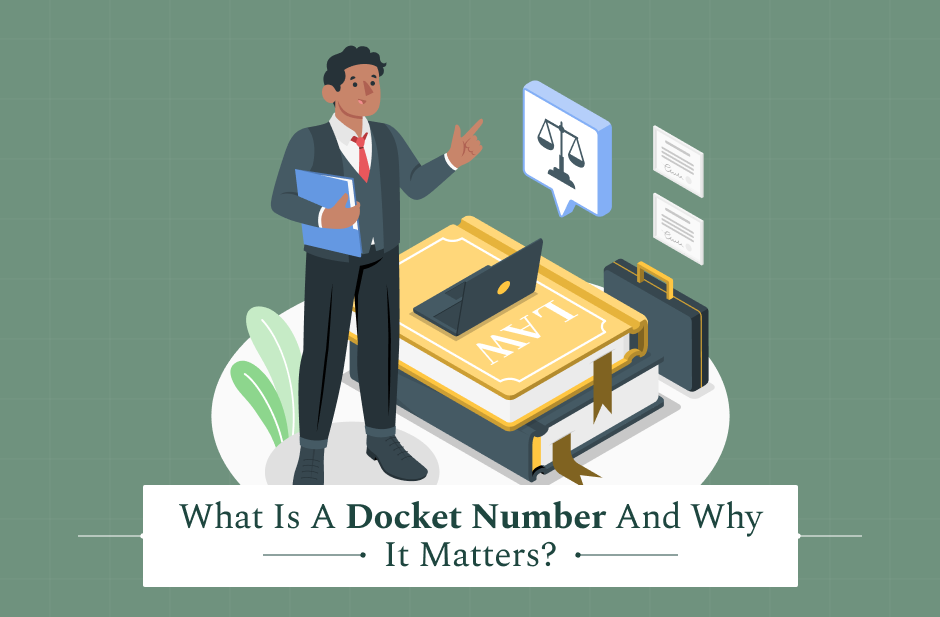A lot of us have wondered, “What is a Docket Number?” Any document that comes from court, or even when you hear an account of some notorious litigation has a common element- Docket number.
In a sentence that reads, “Docket No. 23-CR-4567” – What is a docket number here? And more importantly- what does a docket number signify?
You may find yourself wondering what this number means. You should definitely have a complete idea on what is a Docket Number when dealing with U.S. courts.
A Docket Number is an identification number assigned to a case by the court. The docket number serves as an official title of any lawsuit, prosecution, or action from commencement to disposition. This guide enables one to understand what a Docket Number is and how to use it.
We explore here the different numbering formats, jurisdictional differences, and practical tips on finding information in American court systems. Such knowledge assists attorneys, parties, and the general public in tracking critical legal proceedings effectively.
What Is A Docket Vs. Docket Number?

The docket is sometimes confused with the Docket Number, although they represent two different things. Their differences are as follows.
The Court Docket – The Case Log
What is a Docket number and how do I find it? First, look to the court docket. The docket is a running log or record of all activities in a case. Courts make this record starting from the filing of a case.
Thus, the docket enumerates all the filings, proceedings, orders and judgments. It offers a complete chronology of the history of the case. As the case travels through the system, the court records staff update the docket constantly.
The Docket Number – Unique Case ID
The Docket Number serves as that unique key to open that docket log. We can think of it as a unique identifier that is special to a case record. In other words, the docket actually provides one a record of that particular case. Thus, a Docket Number is the reference code for that record.
You utilize the Docket Number whenever you have to look up that case or need to file new documents in that case.
Why Docket Numbers Are Important

What is a docket number? The question speaks for itself considering the millions of cases that are filed every year. Efficiency in the courts demands clear identification.
Docket numbers have several functions:
Case Tracking
The court uses a docket number to ensure that filings, motions, and orders all belong to the right case. It doesn’t allow chaos in high-volume legal environments.
Organization And Indexing
It ensures all papers in the case refer to the same identifier. The clerks index every document by the docket number.
Public Access
The Docket Number is the surest way for the general public to gain access to case files and hence monitor case proceedings. It would be utilized by legal researchers on a continuing basis.
Avoiding Confusion
It helps avoid confusion between cases with similar names, especially in cases filed in the same year or in the same court. If you use the correct Docket Number, you access the correct case.
How Docket Numbers Are Assigned And Formatted?
The best way to understand what a Docket Number is, is by looking at its structure. Federal and state courts follow specific conventions when they create a Docket Number.
Court Clerk’s Role And Timing
The court clerk assigns the Docket Number immediately upon the initial filing of the case. Upon the court’s acceptance of the complaint or indictment, the case is assigned its unique number. The number assigned remains with the case throughout the case in that court. As such, the first step in litigation will always be receipt of the Docket Number.
What Is A Docket Number: Components Of A Docket Number Format

Most U.S. court docket numbers are not just random numbers but alphanumeric codes that carry significant internal information.
Many courts include the following components:
1. Year Of Filing
The year the case was filed is given by the first two or four digits; for example, ’23’ for 2023.
2. Case Type Identifier
Letters specify the case type
‘CV’ for Civil, ‘CR’ for Criminal, ‘AP’ for Appeal, ‘BK’ for Bankruptcy, or ‘SC’ for Small Claims.
3. Sequential Number
This is a unique number in sequence for cases filed in that particular year.
Optional Judge Initials: Sometimes, initials identifying the assigned judge appear at the end – for example, (JHS).
For example, one common Federal District Court format might be: 24-CV-1045 (JHS). This lets you know it was filed in 2024, that it is a Civil matter, it was the 1,045th case filed that year, and the assigned judge has the initials JHS.
Changes, Multiple Dockets And Mergers
Sometimes, there is more than one Docket Number for a single legal matter. There are several reasons this occurs. In consolidations or mergers of cases for efficiency, one Docket Number takes over the others.
Cases also often receive a new Docket Number when going to the higher court on appeal, according to the Legal Information Institute, Wex. For instance, if a case is in a state trial court, it receives one number.
What is a docket number and how does it play a part in appeals? Well, if a party appeals that decision, the State Court of Appeals gives a completely different, new Docket Number.
How To Use A Docket Number In Practice?
Knowing what is a docket number is useful only if one knows how to leverage it.
Accessing Federal Case Information Via PACER
The Docket Number is used for accessing federal court records. All federal courts use the service called PACER for Public Access to Court Electronic Records. You have to have the correct docket number to use the PACER system in order to search for and download case documents. Without it, searching can be very laborious and time-consuming.
Locating Information When You Don’t Have The Number
What if you lost the court papers, and you don’t know your Docket Number? Don’t worry. You still have options:
Search By Party Name
Most court web portals enable search based on party name, meaning the names of the individuals or companies concerned.
Search By Filing Date
You can narrow the search if you remember approximately when the case began.
Contact The Clerk
The most direct route is calling the court clerk’s office. Provide the names of parties involved and the year of filing. They can give you the correct Docket Number.
Non-Judicial Docket Numbers (Agency Dockets)
The docket number question does not apply only to court cases. Federal agencies (like the Environmental Protection Agency, or EPA, and the Federal Communications Commission, or FCC) also use similar docket numbers.
These agency docket numbers identify and track proposed rules, public comments, and regulatory actions. They work just like court docket numbers, keeping all of the documents related to a specific regulation together in one place.
Pitfalls And Best Practices
Proper utilization of the Docket Number is essential for all litigants but more so for pro se parties. The result of misuse is very serious.
Now, let us look at Common Docket Number Pitfalls.
Mistyping
One typo in the Docket Number sends your filing into the wrong case file. Processing is delayed as a result.
Using The Wrong Number
Always use the current Docket Number. If your case was transferred to a new court or moved on appeal, your old number is no longer valid. If you file a document using the wrong, old number, the court will reject your document.
Consolidation Confusion
When more than one case consolidates, the court often issues an Order of Consolidation. That order identifies which Docket Number is the lead/master number. Use only the lead number.
Best Practices Checklist
Always verify your Docket Number with the official court record. Keep in mind the following checklist:
1. Verify
Always verify the number with the court clerk’s office before filing.
2. Include
You must include the full, correct Docket Number on every single document you submit to the court.
3. Docket Number
Record in your file the original Docket Number of your case and any subsequent numbers assigned on appeal.
4. Check Jurisdiction
Be certain to use the proper numbering convention for the appropriate state or federal court.
Why Understanding What A Docket Number Is Keeps Cases Moving
A docket number is the anchor for every legal matter. It is a tool that will keep your matter organized and searchable, and all information about your case accurate. Once you know what a Docket Number is, you are in control of tracking your matter. That little identifier enables transparency and access to justice across this country. Make sure you treat this number with the importance it deserves.
What Is A Docket Number? – Frequently Asked Questions (FAQs):
We have explained the full meaning and practical use of What is a Docket Number in the U.S. legal framework. This small alphanumeric code provides the key to the whole court record, confirming the importance of “What is a Docket Number?” in daily legal practice.
It’s a standard thing for questions like this to arise, regarding how the Docket Number actually works. The clerk’s office will always answer procedural questions.
These are two terms often used interchangeably in the United States and yet are different. The case number conventionally refers to the sequential tracking number used by the clerk’s office internally, while the Docket Number is the full alphanumeric identifier used by the public and which appears on filings.
Generally, where the full, official ID is required on a document, use the Docket Number.
A court of appeals assigns a new, different Docket Number when the case is moved up from the lower court.
This is because the appellate court treats the appeal as a new action filed within its jurisdiction. Therefore, the previous number of the trial court does not apply during the pendency of the appeal.
No, this Docket Number serves to identify the case only. If a court seals the docket or any documents under a judge’s order-which quite often happens in sensitive cases related to juveniles or national security-the Docket Number would be there, but the details will not be accessible. You have to check the rules of the court regarding access.
















